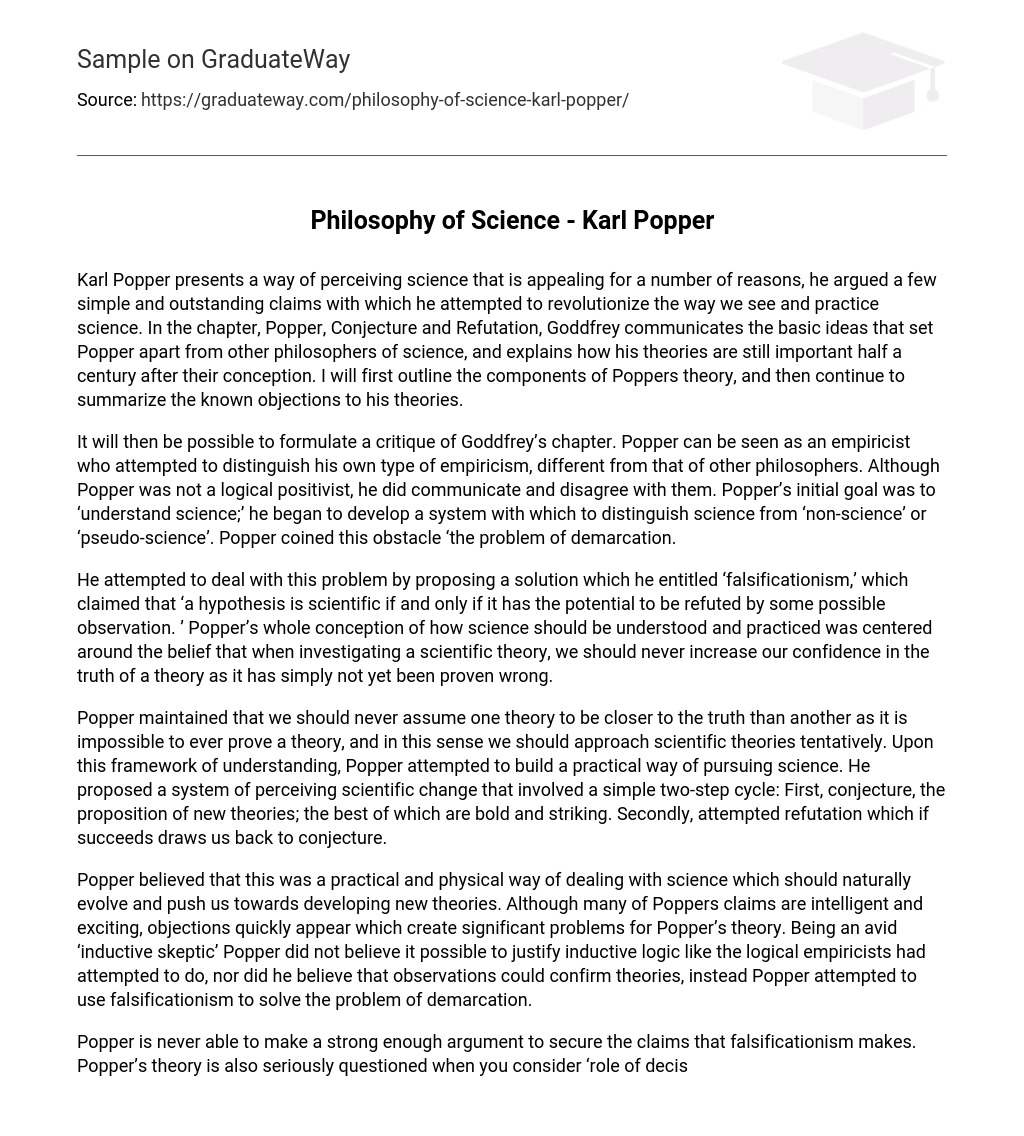Karl Popper presents a way of perceiving science that is appealing for a number of reasons, he argued a few simple and outstanding claims with which he attempted to revolutionize the way we see and practice science. In the chapter, Popper, Conjecture and Refutation, Goddfrey communicates the basic ideas that set Popper apart from other philosophers of science, and explains how his theories are still important half a century after their conception. I will first outline the components of Poppers theory, and then continue to summarize the known objections to his theories.
It will then be possible to formulate a critique of Goddfrey’s chapter. Popper can be seen as an empiricist who attempted to distinguish his own type of empiricism, different from that of other philosophers. Although Popper was not a logical positivist, he did communicate and disagree with them. Popper’s initial goal was to ‘understand science;’ he began to develop a system with which to distinguish science from ‘non-science’ or ‘pseudo-science’. Popper coined this obstacle ‘the problem of demarcation.
He attempted to deal with this problem by proposing a solution which he entitled ‘falsificationism,’ which claimed that ‘a hypothesis is scientific if and only if it has the potential to be refuted by some possible observation. ’ Popper’s whole conception of how science should be understood and practiced was centered around the belief that when investigating a scientific theory, we should never increase our confidence in the truth of a theory as it has simply not yet been proven wrong.
Popper maintained that we should never assume one theory to be closer to the truth than another as it is impossible to ever prove a theory, and in this sense we should approach scientific theories tentatively. Upon this framework of understanding, Popper attempted to build a practical way of pursuing science. He proposed a system of perceiving scientific change that involved a simple two-step cycle: First, conjecture, the proposition of new theories; the best of which are bold and striking. Secondly, attempted refutation which if succeeds draws us back to conjecture.
Popper believed that this was a practical and physical way of dealing with science which should naturally evolve and push us towards developing new theories. Although many of Poppers claims are intelligent and exciting, objections quickly appear which create significant problems for Popper’s theory. Being an avid ‘inductive skeptic’ Popper did not believe it possible to justify inductive logic like the logical empiricists had attempted to do, nor did he believe that observations could confirm theories, instead Popper attempted to use falsificationism to solve the problem of demarcation.
Popper is never able to make a strong enough argument to secure the claims that falsificationism makes. Popper’s theory is also seriously questioned when you consider ‘role of decisions’ concerning observations, as well as the the holistic nature of scientific testing. Goddfrey is quick to point out these problems, and does not hesitate to criticize Popper for his inadequate response to them.
Goddfrey clearly identifies how a vicious circle is drawn between the inevitability of holism, and Poppers objection to inductive knowledge. The latter half of the chapter steps away from rejecting theories, and concentrates on Poppers method for choosing theories. This section is a prime medium through which Goddfrey can be critically evaluated. He uses the ‘bridge building case’ to bring the technical inadequacies of Poppers theory to light as Popper cannot give a sufficient explanation for why theories are adopted.
The scenario presents a situation where engineers and scientists who want to build a bridge must choose between two theories; one of which has been tried and tested without fail thus far, the other is a brand new theory which has not been tested. Falsificationism claims that there should be no reason to choose theory number one over number two as neither are closer to an objective truth whilst the objector would argue that realistically number one is more likely to be chosen, because of induction and reliance on a ‘proven theory’.
Popper claimed that in choosing a theory one is not making taking an inductive step towards confirmation, they corroborated. Goddfrey’s chapter would have benefitted from a more detailed explanation of corroboration, and how it differs from confirmation. Although he presents the bridge building case in a clear manner he never truly explains Poppers response to the objection. However, Goddfrey manages to look past the technical inefficiencies associated with Popper’s theory and communicates what is truly important; the fallible essence of Poppers theory that forced a change in the way we perceive science.
The spirit of his argument has had a lasting impact on our modern conception of scientific knowledge. Goddfrey succeeds in contextualizing Popper, his writing style paints a vivid picture of the exciting possibilities that Popper’s theory created, he uses Popper as a Segway through which we begin to see a change in the way science was to be thought about. Goddfrey offers an outline of Karl Popper’s work that is well-structured and interesting to read.
After introducing and contextualizing Popper’s radical theory of falsificationism, Goddfrey deconstructs the argument by summarizing the main known objections; his analysis of falsificationism and its objections are very well detailed. The bridge building case serves as a medium through which Goddfrey exposes the technical inadequacies of Popper’s argument; the objections to Popper’s theories were well explained where-as Popper’s responses to these objections such as his corroboration could have been more detailed.
Above all, Goddfrey succeeds in explaining how although Popper’s theory lacks essential technical content, the essence of his argument remains relevant and should not be overlooked. I applaud Goddfrey for doing more than condemn Popper for the methodological inefficiencies of his argument; he extracts the value of Poppers theory, a feature of upmost importance when studying the history and philosophy of science.





